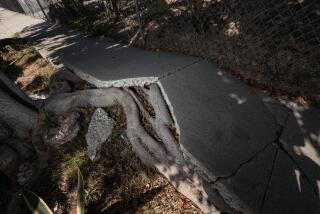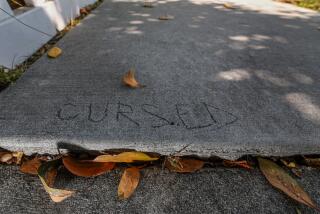Disabled homeowners entitled to wheelchair access
- Share via
Question: Our San Pedro development has no sidewalks. We own the streets and walkways. As a board member, I tell my colleagues we must fix this problem, but they refuse. Serious situations have occurred in which people in wheelchairs or using walkers couldn’t maneuver from the street to a walkway or to their front door or garage. When it’s windy or rains, it’s really hard, if not dangerous, to maneuver.
Except for driveways, we don’t have cut-out curbs and we don’t have marked areas for disabled parking or access. Wheelchairs have gotten stuck or tipped over. Vans with back- or side-loading lifts have no way to load or unload wheelchair occupants.
To address the problem, management sent this communication: “Board: The Attorney just called. His opinion on the ingress/egress parking question is that the CC&Rs; [covenants, conditions and restrictions] do not require that the Board has to restrict parking in front of the walkways. The parking of a car in front of a walkway does not impinge on another’s right to ingress/egress. You can get around the car to the walkway.”
The association’s attorney won’t speak to board members, only to the management company. I don’t know what to do. Please, can you direct me?
Answer: Given that the walkways and roadways within a complex are usually common areas owned by the association, under Civil Code section 1361(a) owners have nonexclusive rights of ingress, egress and support, if necessary, through the common areas that are subject to these rights.
Section 1361(b) provides an easement for ingress, egress and support, if necessary, appurtenant to each separate interest. The common areas also are subject to these easements.
The board’s obligations include repairing the association’s common property. It may or may not be required to comply with certain sections of the Americans With Disabilities Act, Fair Housing accessibility guidelines and minimum property standards unless a change is made to the common area. Even without making any changes, minimum compliance might include making cuts in the curbs or in the walkways and crosswalks, or both, to enable wheelchairs to safely cross the curb line.
If curb cuts are the minimum requirement and your board fails to do that work, the association could be exposed to potential liability.
Noncompliance could subject the entire community to penalties, lawsuits and liability that insurance may not cover. The board should be taking steps to avoid that potential danger.
Privately owned property that subjects anyone who is disabled or physically challenged to unequal access because of that disability may be illegal. Definitions of several disabilities can be found under the California Code of Regulations section 7293.6.
The association attorney has a duty to communicate directly with the client, which is the association as represented by the board. Communicating with anyone else regarding association business is a breach of the attorney-client privilege and could subject the attorney to discipline by the state bar. Management companies do not qualify as conduits through which legal advice passes, as they are vendors, not owners. The attorney’s duty of loyalty is to the client.
As a board member, it is your duty to raise the issue of a breach of attorney-client privilege by the association’s attorney and consider his or her swift termination.
Any board that refuses to talk, listen or respond to titleholder issues breaches its duty to the homeowners.
Check with your association’s insurance carrier to see if it will defend your board’s actions and indemnify these directors for their decision not to accommodate the physically challenged owners, then document it in the minutes distributed to all titleholders.
Send your questions to P.O. Box 11843, Marina del Rey, CA 90295; e-mail noexit@mindspring.com.


